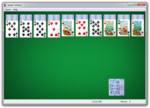Spider solitaire
Spider solitaire is a card game that you can play with cards on your computer. You could play it alone with an empty table top, but who has an uncluttered tabletop surface handy? It is one of the most popular and addictive computer games of all time. It is so addictive that many employers have deliberately uninstalled it from their computers to prevent employees from playing it on the job, forcing them to play less-addictive Facebook games instead. You start out with several stacks of cards, the top one is face up, and the rest is face down. There are three difficulty levels: Easy, which allows you to play with just one suit, Intermediate, which allows you to play with two suits, and Advanced, which requires three suits. This game is included with every Windows computer since Windows ME.
How to Play
In this game, you must place cards in descending order (K, Q, J, 10...) in order to complete a sequence of cards. When you run out of moves, you deal another hand from the deck, which places new cards on top of the stacks. The objective of the game is to make each of the stacks as long as possible. If you complete all the sequences of cards by some miracle, you lose, and the computer celebrates your loss with rounds of fireworks. The computer is a sore loser however, and once you have made each of the stacks as long as possible and have no more cards to deal, it will lie and tell you that you have lost.
Strategy
One strategy is to move Ace cards to empty stacks. This way, you must find a 2 in order to move the Ace away from the empty stack to free up the stack so that you can unhide more cards. In general, where you can stack different suits, do so. This will show off your elite skills in "untangling the cards" and swapping them back and forth for the win. You want to get all the cards from the stacks face down so that you can better decide your next move. Another strategy is to get each of the stacks as long as possible. The longer the stack, the better your odds of winning. You should use the Hint button as often as possible, because it annoys the computer, and everyone knows an annoyed opponent is more likely to lose. Undoing the last move, and then redoing it, as often as possible, is another great way to annoy the computer.
Scoring
You get 10 points for every card that is left face up after all the cards have been dealt. You lose 50 points for each sequence of cards that you have completed. If you completed all eight sequences of cards, you get -500. Remember, the computer is keeping track of its own score, not yours. The computer starts with 500 points and loses one point for every move you make. It gains 100 points for every sequence of cards you complete. Remember, at all costs, you do not want the computer to win!

